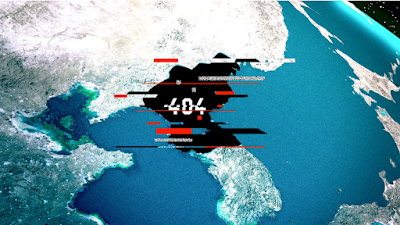A man's cyberattack on North Korea is kind of funny. And absolutely scary.
[In late January], observers of North Korea's strange and tightly restricted corner of the internet began to notice that the country seemed to be dealing with some serious connectivity problems. On several different days, practically all of its websites—the notoriously isolated nation only has a few dozen—intermittently dropped offline en masse, from the booking site for its Air Koryo airline to Naenara, a page that serves as the official portal for dictator Kim Jong-un's government. At least one of the central routers that allow access to the country's networks appeared at one point to be paralyzed, crippling the Hermit Kingdom's digital connections to the outside world.
And what state's cyber warriors took down North Korea's Internet?
But responsibility for North Korea's ongoing internet outages doesn't lie with US Cyber Command or any other state-sponsored hacking agency. In fact, it was the work of one American man in a T-shirt, pajama pants, and slippers, sitting in his living room night after night, watching Alien movies and eating spicy corn snacks—and periodically walking over to his home office to check on the progress of the programs he was running to disrupt the internet of an entire country.
Huh.
I have noted that the many private individuals who have hacker skills could in effect conduct their own foreign adventures while in their pajamas. These cyberbooters could attack nations they identify as enemies for fun or profit much like 19th century freebooters played in Central America or in the manner that the Irish in America plotted to take over British Canada.
I figured we'd get more of this as time passes.
But could this ability actually drag countries into war?
When the target is our enemy like Serbia was in 1999, it is no big deal. Nor is it vital to address when the attacks were merely cyber spray painting as it was in 1999. But as networks become more vital to economies and militaries, as tools to damage those networks get better and actually replicate the effects of conventional attack, and as civilians gain the skill and tools to actually damage networks seriously, what does our government do?
Will these computer users be a cyber militia to help defend our nation? Or will they be cyber freebooters carrying out independent foreign policies and even waging a kind of war contrary to US foreign policy?
Back to the hacker in the original article:
And what's the final goal of his cyberattacks on that totalitarian government's internet infrastructure? When will he end them?
“Regime change. No, I'm just kidding,” P4x says with a laugh. “I just want to prove a point. I want that point to be very squarely proven before I stop.”
Kidding. For now.
When will private entities organize their own kinetic foreign policy via the Internet? I've complained that "ending" a war is futile if the enemy doesn't cooperate. How much more hollow is that belief if enough of your own people disagree?
How many governments could be vulnerable to a crowd-funded private war?
UPDATE: Of course, North Korea can always go kinetic on the man if it finds out where he lives.
I'm just saying P4x didn't kill himself.


